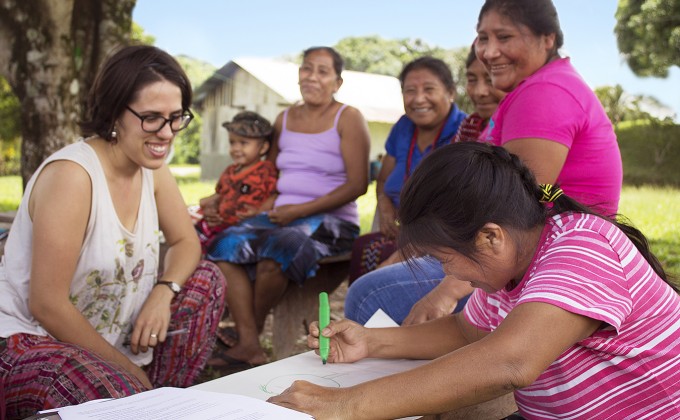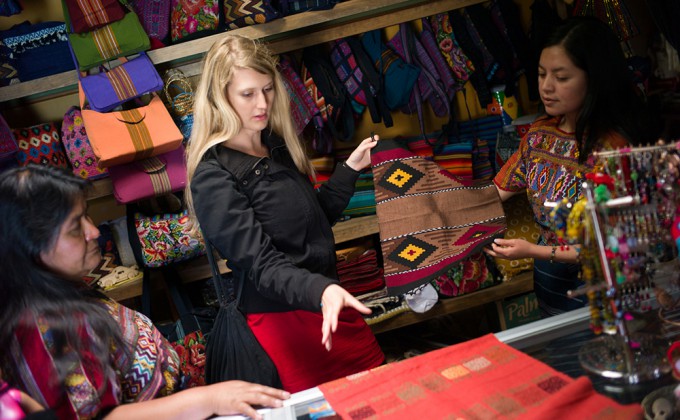
Guatemala

April 2015 to March 2020

Direct: 10 organizations Indirect: 12,000 women and youth

Sustainable Management Authority for the Lake Atitlan Basin and Surrounding Areas (AMSCLAE
Cardamom Exporters Association (ADECAR)
Guatemalan Exporters Association (AGEXPORT)
Association of Friends of Lake Atitlan (AALA)
Guatemalan Association of Women in Coffee (AMCG)
Cooperativa Agrícola Integral La voz del que clama en el desierto
Federation for the Commercialization of Specialty Coffee of Guatemala (FECCEG)
Foundation for Integral Development (FUDI)
Inter-American Institute for Cooperation on Agriculture (IICA)
Ministry of Environment and Natural Resources (MARN)
Pomona Impact

CAN $6,400,000 financed by the Government of Canada through Foreign Affairs, Trade and Development (DFATD)
 Programme Uniterra
Programme Uniterra
 © Michel Huneault
© Michel Huneault
The purpose of the program, which is funded by the Government of Canada’s Department of Foreign Affairs, Trade and Development, is to build the capacities of local organizations and institutions by dispatching Canadian volunteers abroad and supporting cultural communities within Canada.
The Uniterra program supports the development of inclusive market systems with the goal of increasing economic competitiveness and equity for beneficiaries while building the capacities of local actors to whom Canada and countries in the South provide technical support. The 2015 – 2020 Uniterra program helps create environmentally responsible development conditions and economic opportunities for marginalized people (women, youth and Aboriginal people) living in rural Guatemala.
Industries and Objectives:
The agriculture sector is key to the country’s sustainable growth and makes up half of its labour. Inclusive market systems that have been selected for Guatemala are the main drivers of rural economy and include coffee, cardamom (and other spices), processed foods and recyclable material.
Coffee is Guatemala’s chief export and its second largest economic activity in terms of income redistribution. The 125,000 producers in place create work for more than 500,000 people, or 9% of the active population. Women and youth are involved in many activities in the sector, which has strong potential for new opportunities for these actors, especially in the areas of production, nursery management, administration and commercialization. The Uniterra program focuses on two areas with the greatest potential, Sololá and Huehuetenango, where the program has established solid partnerships with organizations serving a large segment of the target population.
Guatemala is the largest producer and exporter of cardamom in the world. International market demand is driving exporters to work with small-scale producers in order to produce high-quality products. There are currently more than 350,000 cardamom producers in Guatemala. Cardamom has great potential to create jobs for women and youth in the cosmetology industry, in which harvests are processed into essential oils and local export markets have already been established. The Uniterra program is focusing on the Alta Verapaz department, where nearly 70% of the country’s production occurs.
The food processing industry has continued to develop over the past five years and has created 75,000 jobs, according to official figures. This stands to increase 147% by 2021. There is a strong potential for growth that could create jobs for women and youth processing and packaging fruits and vegetables and preparing marmalades and jellies. At least 40% of production in this sub-sector is generated in the western cities San Marcos, Huehuetenango, Totonicapán, Quetzaltenango and Sololá, where the Uniterra program has been focusing its activities.
In urban and rural areas, processing recycled materials is a growing industry due to the industrialization of production and the lack of available resources to manage home and industrial waste. Protecting the environment in Guatemala is a key concern, given the importance of the tourism industry and conserving natural resources (water and air) and biodiversity.
Impact:
By 2020, Uniterra will have contributed to the economic, social and professional inclusion of at least 12,000 Guatemalans (60% women and 40% youth) by getting them involved in one of the four growing industry sectors.
